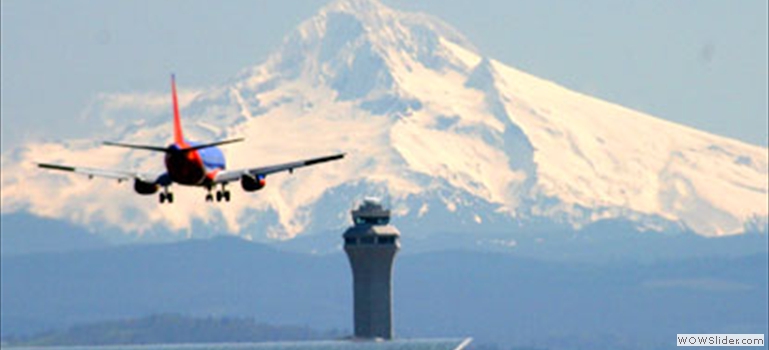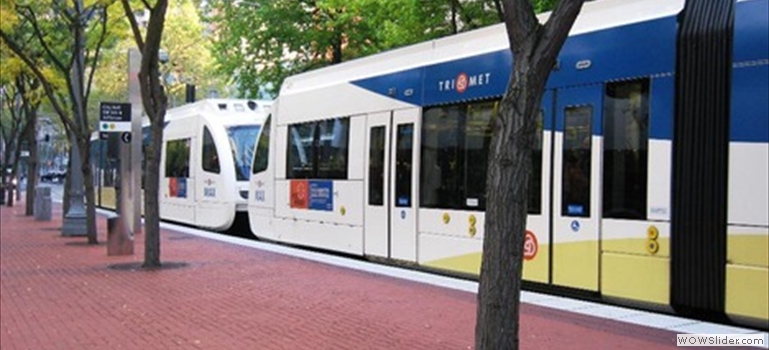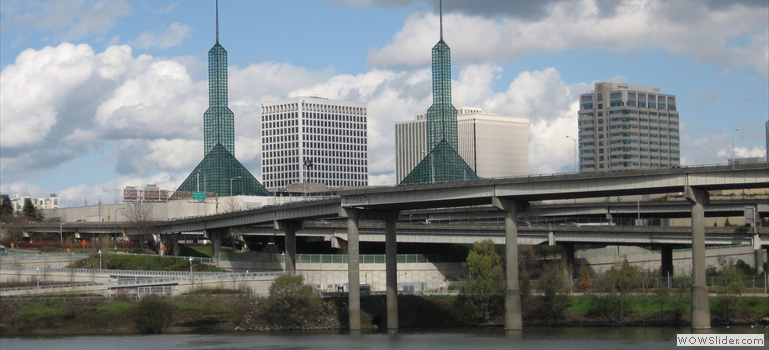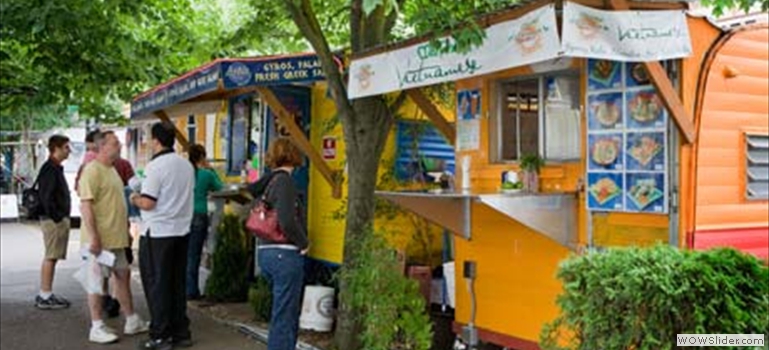
Tipping Guide
- Restaurants: 15% - 20% of the total bill is a good general rule of thumb, however, please note that many restaurants will automatically add 18% gratuity/tips to the bill for parties of 6 or more people
- Hotel Personnel/Porterage: $2.00 - $3.00 per piece of luggage or parcel
- Valet Parking: $2.00 - $3.00 to attendant
- Housekeeping Services: $2.00 - $3.00 daily
- Taxi: 15% of total fare
- Concierge Services: $5.00 or more
Weather
Portland experiences a temperate climate that is usually described as oceanic with mild, damp winters and relatively dry, warm summers. Like much of the Pacific Northwest, according to the Köppen climate classification it falls within the cool, dry-summer subtropical zone, also referred to as cool-summer Mediterranean, because of its relatively dry summers. Other climate classification systems, such as Trewartha, place it firmly in the Oceanic zone.
Summers in Portland are warm, sunny, and rather dry, with August, the warmest month, averaging 79.7 °F (26.5 °C), and much larger day-night variation than in winter. Because of its inland location and when there is an absence of a sea breeze, heat waves occur (in particular during the months of July and August) with air temperatures sometimes rising over 100 °F (38 °C), but 90 °F (32 °C) is more commonplace, occurring 13 days per annum.
Transportation
I-5 Closure Warning
Read more about I-5 Closure here.
Book Travel
The official ESA travel agent, Joseph Vengersammy with First in Service Travel, has arranged for discounted flights to Portland. Please note there is a $35 fee for using his service. Contact Joseph by email at joseph@1stinservice.com, by phone at 212-398-6555 ext. 1290, or by mail at 130 West 42nd Street, Suite 401, New York, NY 10036. https://firstinservice.com/eforms/index.php?sid=32785
Portland International Airport
 Portland International Airport (PDX) is a joint civil-military airport and the largest airport in the State of Oregon, accounting for 90% of passenger travel and more than 95% of air cargo of the state. It is located within Portland's city limits just south of the Columbia River in Multnomah County, 12 miles by highway northeast of downtown Portland.
Portland International Airport (PDX) is a joint civil-military airport and the largest airport in the State of Oregon, accounting for 90% of passenger travel and more than 95% of air cargo of the state. It is located within Portland's city limits just south of the Columbia River in Multnomah County, 12 miles by highway northeast of downtown Portland.
PDX has direct connections to major airport hubs throughout the United States, plus non-stop international flights to Canada, Japan, Mexico, and the Netherlands. It is a hub for United Express affiliate SkyWest Airlines for flights to smaller cities in Oregon, Washington, Idaho, California, and Nevada. The airport is a major hub for Alaska Airlines and Horizon Air, and serves as a maintenance facility for Horizon Air. Local transportation includes light rail on the MAX Red Line and Interstate 205.
The pickup area for taxis, town cars, long-haul shuttles, hotel vans, and parking lot shuttle buses is located in the center section of the airport terminal's lower roadway on the baggage claim and departure level. Airporter shuttles, off-airport rental car shuttles, and reserved vehicles are found in the section of the lower roadway closest to the garage. Most transportation providers serve downtown Portland, which is approximately 20 to 40 minutes from Portland International Airport.
TriMet's MAX
 TriMet's MAX (Metropolitan Area Express) Light Rail connects downtown Portland to the Portland International Airport. Hours of operation vary, but all MAX lines run every 15 minutes or more frequently throughout most of the day, every day.
TriMet's MAX (Metropolitan Area Express) Light Rail connects downtown Portland to the Portland International Airport. Hours of operation vary, but all MAX lines run every 15 minutes or more frequently throughout most of the day, every day.
- You must have a validated ticket, bus transfer receipt or pass before boarding MAX. Ticket machines and validators are located at the airport station.
- Signs at the station indicate where to wait and when the next train is due. Signs on the front of each train identify the line (Blue, Green, Red, or Yellow) and destination.
- As MAX approaches, stay well behind the white bumpy tiles and wait for the train to come to a complete stop.
- The doors will open automatically and you can board the train. If you're standing, move back so others can board.
- MAX stops at every station, so you don't need to signal the operator to get on or off. The station name is announced before each stop and appears on a reader board overhead.
- Gather and take all your personal items when you exit the train.
Ticket Machines
You can buy many TriMet fares from the ticket machines located at MAX and WES stations. Tickets and passes are valid on buses, MAX Light Rail, WES Commuter Rail1, and Portland Streetcar.
How to use the ticket machine
- Select the fare you want by pressing one of the buttons below the video screen. Look at the screen to find out how much you need to pay.
- Insert payment. Most machines accept debit/credit cards (Visa, MasterCard, and Discover), coins (including $1 coins) and bills ($1, $5, $10 and $20). Some machines labeled "Card Only" accept debit/credit cards only. All WES ticket machines are card only.
- Collect your tickets and change from the tray at the bottom left.
| 2-Hour Ticket2 | 1-Day Pass |
7-Day Pass |
14-Day Pass |
1-Month/ 30-Day Pass |
1-Year Pass |
||
|---|---|---|---|---|---|---|---|
| 1 Ticket | Book of 10 | ||||||
| Adult All Zones |
$2.40 | $24 | $5 | $24 | $46.50 | $92 | $1012 |
| Adult 2 Zones |
$2.10 | $21 | $5 | $21 | $41 | $81 | $891 |
| Honored Citizen All Zones |
$1 | $10 | $5 | — | $13.50 | $26 | $286 |
| Youth All Zones |
$1.50 | $15 | $5 | — | $14 | $27 | — |
| LIFT Paratransit All Zones |
$1.85 | $18.50 | $5 | — | $26.50 | $52 | $624 |
Adult: Age 18-64
Honored Citizen: Ages 65+ people on Medicare and people with a disability
Youth: Ages 7-17 and students in high school or pursuing a GED
LIFT Paratransit: TriMet LIFT service is available only to people whose disability prevents
them from using regular bus, MAX and WES service for some or all of
their trips. All LIFT trips are by advance reservation, and service is from the door at the
pick-up location to the door at the destination. Several passengers share
the vehicle, and vehicles may make stops and travel in other directions
during any passenger’s trip to accommodate other riders.
Contactless cards
Some ticket machines accept "contactless" credit cards (those equipped with a microchip) as well as traditional swipe cards. If you have a contactless card, just tap it on the target where indicated. Contactless credit cards include Visa© payWave©, MasterCard© PayPass©, and American Express© ExpressPay©.
Bike Information
Portland's reputation as the most bike-friendly city is well-earned, so why not participate in the cycling culture during your stay? These bike rental spots will help you get on your way. For information on rates, please contact the individual shops.
http://goseeportland.com/guides/204-portland-bicycle-rentals
The Oregon Convention Center
 The Oregon Convention Center (OCC) is the preferred destination for many groups because of its world-class features and amenities, award winning customer service, and leadership in sustainable practices. The largest convention center in the Pacific Northwest, the OCC designed and launched an extensive sustainability program, incorporating a broad range of practices - from composting to water conservation. These environmental changes earned it the distinction of being the first convention center certified under the Existing Buildings (EB) program of the Leadership in Energy and Environmental Design® (LEED) Green Building Rating System. OCC recycled more than 315 tons of materials in the last 2 years alone.
The Oregon Convention Center (OCC) is the preferred destination for many groups because of its world-class features and amenities, award winning customer service, and leadership in sustainable practices. The largest convention center in the Pacific Northwest, the OCC designed and launched an extensive sustainability program, incorporating a broad range of practices - from composting to water conservation. These environmental changes earned it the distinction of being the first convention center certified under the Existing Buildings (EB) program of the Leadership in Energy and Environmental Design® (LEED) Green Building Rating System. OCC recycled more than 315 tons of materials in the last 2 years alone.
OCC Facts at a Glance
- The facility covers about 1 million square feet, including 255,000 square feet of exhibit space, 50 meeting rooms, and 2 ballrooms. It hosts an average of 700 events and 700,000 people annually.
- The Center recycled more than 315 tons of materials in 2009–2010.
- The OCC is committed to achieving a 75% recycling rate by 2012.
- The OCC was the first convention center to re-certify at a higher level (Silver) under the LEED-EB program.
Recycling Program Overview
The OCC has operated a recycling program since 1990. Today, the OCC manages an extensive recycling program that includes organic waste, cardboard, mixed paper, cans, plastics, glass bottles, wood pallets, cooking oil, electronic equipment, and landscape trimmings. The Center generated approximately 552 tons of waste in fiscal year 2009–2010, and diverted more than 315 tons of materials from landfilling through recycling, composting, and donating. Notably, the OCC implemented and continues to run its recycling program without grant money or other financial support. Savings are now achieved through a dynamic familiar to operations personnel: preventing waste and increasing recycling to reduce landfill hauling costs. The waste stream at the OCC comes from a variety of sources including conference center attendees, contracted food service employees, and OCC staff. Conference and event attendees mostly generate paper and beverage containers; vendors generate food waste, cardboard, and containers; custodians or event vendors unload pallets with recyclable shrink wrap at loading docks; staff for the OCC’s contract food service provider handle food waste in the kitchen or dining rooms; and office and administrative workers generate paper and beverage containers. To help with collecting such recyclable materials, all public spaces inside the Center have convenient, clearly marked bins.
Nuts and Bolts Bins and Placement
The OCC has 65 three-container waste bins for mixed recycling, glass recycling, and trash. The bins are used in meeting rooms and other high traffic areas to collect discarded material from event attendees. Separation of wastes and recyclables has been very successful in the meeting areas, with low contamination rates. Recently, the OCC rolled out a redesign of the container signage throughout the facility for clearer communication. Signs with pictures of what can be recycled—aluminum cans, plastic and glass bottles, etc.— have been placed on the bins to better direct the public and staff.
The Operations Department
Staff use a variety of receptacles to move the waste and recyclables: 25 rolling dumpsters, 25 rolling cages, 30 64-gallon recycling roll carts, and 30 64-gallon composting roll carts. Many of these are located in the “back of the house”—to be used by staff and exhibitors away from public view. The Center places “Wet” and “Dry” signs on rolling dumpsters.
Collection Event: attendees separate much of the OCC’s waste themselves when they dispose of it in the clearly marked receptacles. Convention center crews, three shifts with 40 people total, collect waste left in public places such as unwanted items from exhibits. The crews sort recyclable material from nonrecyclables at their locations throughout the halls and meeting rooms, or at the back of the building. The nonrecyclable material is then further sorted into wet and dry portions. Dry waste is hauled to a transfer station, where further sorting pulls any other recyclables. Twice a week, recyclables are collected from the Center and hauled to a local material recovery facility less than 10 miles away. The
OCC uses three sites on its loading dock to transfer waste and recyclables. The dock is located at the rear of the building, near the equipment used for disposal, and there is a staging area of about 1,500 square feet. The equipment, run by OCC staff, includes two 25-yard compactors (one for wet waste material and one for dry); a 15-yard cardboard baler; and a 20-yard cardboard compactor. OCC staff bales and prepares all the material.
Visitors to the Center can recycle mixed paper, aluminum cans, and plastic and glass bottles in the numerous recycling bins conveniently located throughout the facility.
Food Waste
The OCC donates leftover preconsumer meals and other food items through partnerships with local food shelters and food banks. Large food-focused events are specially targeted for capturing food donations from exhibitors. At a recent event, 10 tons of donated food was diverted through this effort. The OCC also composts pre- and postconsumer food waste, the heaviest waste material. The Center captures all food waste from its contractor’s operations and the Center’s hauler transports the waste once a week to a transfer station. By removing food waste from the landfill waste stream, the OCC significantly reduces disposal costs that are dependent on weight. Other materials that are not food waste are composted. Box lunches that include compostable plates, coffee cups, flatware, and barware can be tossed in among food scraps and other organic material. The OCC composts food service paper towels too. Currently, most disposable items provided in catering and concession services are compostable. However, a few items, including soda containers and beverage lids, are not yet available in a compostable version that is accepted by Cedar Grove, OCC’s offsite composting facility.
OCC recently made its collection process for food waste more efficient by converting a compactor for organic materials. The composting area is power-washed weekly, and other odor-control measures are in place. All collected material from the Portland area is taken to Cedar Grove Composting in Maple Valley, Washington, where it is made into finished compost for gardening. Cedar Grove is a 60-day compostable site, meaning it only accepts material that will degrade within 60 days. In order to divert as much organic material as possible, the OCC uses only 60-day compostable material approved by Cedar Grove. Although the OCC receives no payment from Cedar Grove, it does not have to pay composting fees, making this process less expensive than paying hauling fees for landfilling. For help with collecting compostable material, event organizers can pay a separate fee to have staffed recycling and composting stations called Sustainability Stations. The stations help event attendees separate compostable material at a10-by-10-foot booth.
OCC guidelines require purchasing office products that contain recycled content. The Center purchases 100 percent postconsumer recycled-content office paper, and 100 percent recycled-content paper towels and toilet paper from a local manufacturer. All in-house publications are printed on recycled stock using soy-based inks.
Recycling Miscellaneous Materials
Wooden pallets are ubiquitous in the convention industry, and the OCC charges clients for pallets that are left behind. These pallets and other wood scraps go into a wood drop box (an open-top dumpster) for recycling. Occasionally, materials such as metals, concrete, porcelain, and electronics are recycled. The OCC also recycles shrink wrap, clear plastic, and light vinyl table cloths, which are compacted and baled with cardboard.
The Operations Department staff is responsible for separating, processing, and preparing the materials for pickup. Generally, the hauler rejects recyclable material if the contamination rate reaches 2 percent and sends the load to the landfill. If this happens, the OCC is charged twice the hauling fee for the same load. Facing such a penalty, Center staff work diligently to prevent contamination and loads are rarely rejected by the hauler. As a result of revised procedures and reporting by the hauler, the Center now benefits from more accurate diversion data.
Education and Evaluation
The OCC educates its custodial force and food service contractor personnel about recycling through on-the-job training, formal annual training, and its Green Team. The Center also offers staff offsite training and access to seminars through groups such as the Natural Step Network, which helps organizations work toward sustainable development. To advertise its recycling program to vendors, event planners, and attendees—and educate them on their roles in supporting it—OCC fact sheets are available on its website and preconference meetings are held with clients. The OCC evaluates its program in various ways. For example, sustainability efforts are discussed in staff and departmental meetings. In addition, OCC staff review monthly hauler reports that break down the recyclables hauled from the Center by category and weight. Clients also weigh in with post-event evaluation surveys.
Waste Prevention Practices
- Staff reduces paper use as much as possible by printing double sided and by using email to send contracts, event documents, and to communicate with clients.
- Condiments, beverages, and other food items are served in large containers instead of individually packaged.
- Five-gallon water bottles on water coolers are provided at events to refill glasses and bottled water is only provided upon request.
Sustainable Choices for Customers
The OCC offers two levels of sustainability and recycling options to prospective event managers: standard and premium. The standard option is included in the facility rental and covers regular operational practices for waste diversion and sustainable food and beverage, including recycling bins for move in/out and for the duration of the event, use of china in carpeted areas, compostable disposables, bulk condiments, excess food donation program, and energy-saving lighting schedules. The premium option includes the standard measures plus a package of a la carte food and beverage services, and a post-event report of total weight of materials recycled, composted, and donated during the event.
Other Environmentally Sustainable Features
The OCC uses an extensive system that collects storm water from the roof and filters it through a series of rock terraces, settling ponds and landscape features. This award-winning rain garden helps to prevent pollutants from reaching the nearby Willamette River. Also outside, grounds and building exteriors are designed to reduce the “heat islands” produced by asphalt, concrete, and hard-surface roofs. Native species and habitat-friendly vegetation is used in landscaping.
Inside its facility, the OCC keeps its energy consumption and costs low through the use of its many windows and skylights, which naturally illuminate the facility. Light sensors reduce the need for artificial light, and individual controls moderate the temperature for each space. The Center also purchases 40 percent of its electrical energy from Pacific Power’s Blue Sky Block Program, which uses renewable wind power. In addition, the Center’s ventilation system brings fresh, outdoor air directly into each major space, not allowing it to mix with exhaust air from the facility.
The OCC also voluntarily joined NW Natural’s Smart Energy Program to help offset the facility’s natural gas usage. Smart Energy supports renewable energy projects by installing bio-digesters at local farms. The OCC pays a fee on its monthly gas bill to participate in the Smart Energy program.
Reasons for Success
The OCC leadership attributes it success to several factors. The Center’s team spirit is exemplified by the Green Team, comprised of individuals from all levels and backgrounds within the organization. The team meets monthly to discuss sustainability issues that affect the OCC and its clients, track programs and projects, and make suggestions for enhancing effectiveness or expanding existing programs. The team also educates staff, clients, and vendor partners on the importance of working toward sustainability. Similarly, the OCC shares its environmental goals with clients at pre-conference meetings, where it details its sustainability and recycling procedures. Management support is also critical to the program’s success. All senior staff and department managers contribute within their areas of focus and are key decision makers for the recycling and sustainability programs.
The OCC also benefits from city and regional resources, such as Portland’s Bureau of Planning and Sustainability, the state’s Department of Environmental Quality, and Metro, the elected regional government that manages waste and recycling for the Portland metropolitan area. One of the most innovative programs that the Center has implemented to help support sustainability is the Gainsharing Agreement between the OCC and the bargaining unit members that have responsibility for day-to-day recycling duties. Members of AFSCME 3580-1 ratified a Gainsharing Agreement in 2008, which awards members a cash incentive for reaching the recycling goals agreed upon in bargaining. The OCC partially funds the program through savings from lower hauling and landfill fees. Forecast Portland currently has a city-mandated recycling program with a 50 percent total diversion requirement for businesses, and has legislated a 75 percent requirement by 2012. The Center exceeded the 50 percent recycling rate in 2008 and is making program adjustments to meet the new target. To centralize management of the recycling program and other environmental elements, the Center hired a sustainability coordinator.
In September 2008, the OCC achieved Silver level LEED-EB and aims to achieve Gold during the next re-certification process. The OCC also hopes to expand its sustainability efforts and reach out to its customers by implementing a voluntary carbon offset program for show managers and attendees. The OCC values LEED certification for its guiding principles to sustainable operation, as well as the recognition it brings within the events industry and green building community.
Food Carts
 Food carts are very popular in Portland and have a wonderful reputation. To find a listing and location go to http://www.foodcartsportland.com/
Food carts are very popular in Portland and have a wonderful reputation. To find a listing and location go to http://www.foodcartsportland.com/
Portland Food Experience
Linger in this epicenter of regional cuisine, where chefs, farmers, ranchers, growers, and producers bring their bounty so you can enjoy what’s fresh, local, and ready right now.Yes, it’s hard to walk a block without the aroma of fresh roasted beans wafting from a corner java joint. In spring through late fall, barely a day goes by without a farmers market bursting to life in one of the city’s neighborhoods. Travel just a bit outside of town and you’ll be surrounded by fields where these farmers grow their goods. It’s what helps make Portland a culinary epicenter, and worthy candidate to be called “Restaurant City USA”. Below are links to finding wonderful restaurants in the Portland area.
http://food.traveloregon.com/regions/greater-portland/
http://pdx.eater.com/archives/2011/10/03/the-38-essential-portland-restaurants-october-2011.php#pointmap
http://portland.diningguide.com/dl1dt.htm
http://www.portlandfoodmap.com/





 phone 202-833-8773
phone 202-833-8773